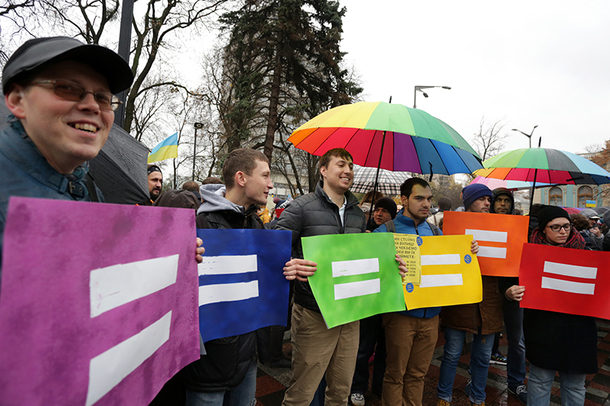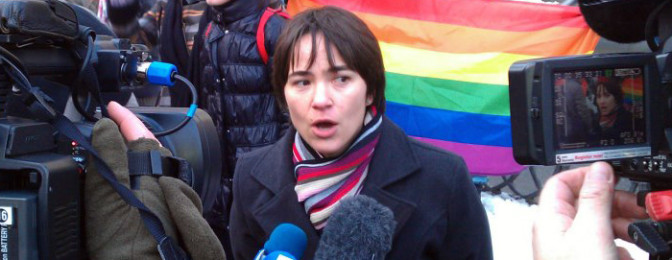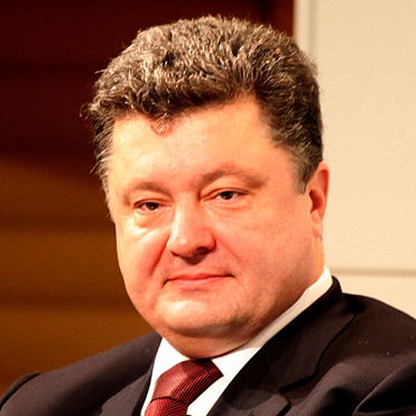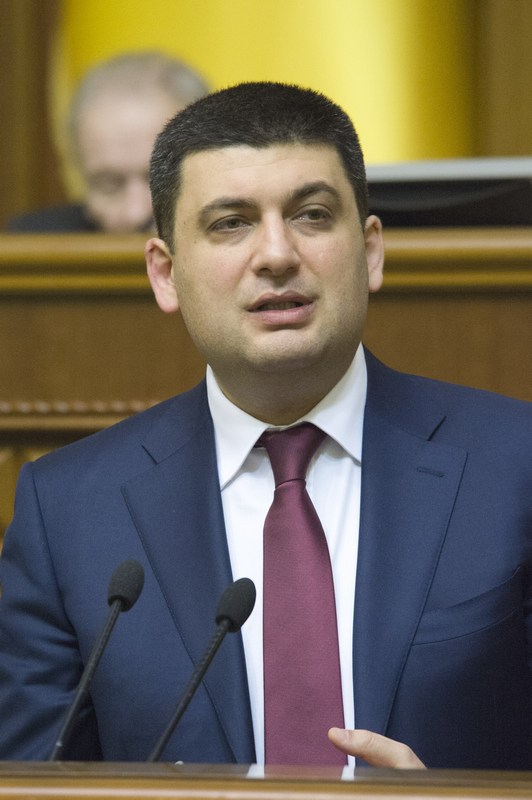Ukraine victory: ‘Celebration with tears on our eyes’
Colin Stewart is a 45-year journalism veteran living in Southern…
LGBT Ukrainians won a victory Nov. 12 with the passage of a ban on employment discrimination on the basis of sexual orientation or gender identity. But was it a hollow victory, and perhaps just a temporary victory?
Olena Shevchenko, chair of the Ukrainian LGBTI advocacy organization Insight, analyzes what led up to the Nov. 12 parliamentary vote in favor of the ban, what was achieved, the harms that were done in the process, and the likely next steps:
Celebration with tears on our eyes

Nov. 12, 2015, will remain a meaningful symbolic date in the history of Ukrainian LGBT movement. On that day, we can say, we made the first visible step towards equality and human rights values. But is it a real achievement? We will see in the future.
Here is my analysis of what really happened during the past few weeks.
Background
In 2014, Ukraine failed to add the prohibition of discrimination based on sexual orientation or gender identity (SOGI) to its anti-discrimination law. We made a number of attempts, which mostly came from the civil society sector. However, citing the war in Eastern Ukraine, our government was able to reach a compromise with the European Union that left open the list of characteristics on which discrimination is prohibited. Ukraine’s main argument was that adding “sexual orientation” and / or “gender identity” to the list would provoke a wave of provocations and conflict escalation.
Of course, even then, we had heard all the familiar arguments — that there is no discrimination against LGBT people in Ukraine, that Ukraine is a tolerant country, that adding SOGI would create “special rights” for LGBT people and so on. The result was the adoption of the law without any protection of LGBT people.
But at the same time, Ukraine also promised the EU that non-discrimination at the workplace would include SOGI, as required by the EU directive.
Speeding up work on a new labor code

Since 2003, Ukraine had been in the process of developing a new labor code to replace the one we had from Soviet times. That process was difficult and slow.
In the end, though, just because of the process of visa-liberalization, officials decided to finish it quickly.
Quickly, but not well. This new code is bad — it’s nothing, it’s awful. It gives all rights to the employer, the role of trade unions is minimized, etc. Many social organizations and movements expressed their expert opinions about this, but unfortunately, in Ukraine, they don’t usually have any impact. What matters are the government and international pressure.
Since the new labor code was developed under the heading of visa liberalization, the parliament (the Verkhovna Rada) quickly adopted it on its first reading. An amendment to prohibit discrimination, of course, didn’t pass, because of the presence there of “sexual orientation.” It is worth noting that the presence of “gender identity” wasn’t a problem, because nobody had a real sense of what that meant. But “sexual orientation” was like a red flag for a bull.
Next came consultations and pressure from the EU on the need to adopt the whole package of visa-liberalization laws. (At this point, it is worth noting that other laws in the package also remained not adopted, including anti-corruption, the removal of parliamentary immunity and so on.)
It took the intervention of the President and some pressure from political clans to convince the deputies that, if they do not vote, their comfortably warm chairs under them in parliament will disappear.
Demonstration and disputes on Nov. 10
On Nov. 10, we staged a joint action urging the adoption of 10 laws from the “visa liberalization package.”
Uniting our efforts with non-LGBT activists was not easy. When they realized that LGBT people would share in the protest, they stiffened and began to demand that we come without any rainbow flags. Discussions in social networks were intense and intolerant. We were told that we already had an LGBT Gay Pride and that this action was not an LGBT event.
They said LGBT symbols attract too much attention to LGBT people and that now is not the best time to discuss LGBT issues, because that is provocative. Those non-LGBT activists’ rhetoric was basically the same as that of our deputies and government officials.
That was the first disappointment for the LGBT community. But in the end we came anyway, displaying our symbols and flags. We had decided there is no place for compromises anymore. And this time many of the protesters were LGBT people and allies.
But deputies failed to approve the anti-discrimination amendment. (It received 117 out of the 226 votes necessary for passage.)
“Sexual orientation” became the No. 1 hurdle on the path to European integration for Ukraine.
After Nov. 10, Ukraine was given one last chance from the EU to approve the remaining four laws, including the anti-discrimination amendment to the labor code.
Symbols and speeches
On Nov. 12, we LGBT people again came to the Verkhovna Rada.
The worst thing we experienced was hearing non-LGBT activists say that we were disrupting a protest again, paying attention only to our own LGBT issue. This is very strange rhetoric and has nothing to do with human rights, but many activists simply do not understand and do not want to analyze it. In addition, I want to mention here some protesters’ posters were misogynistic — for example, “Work, whore!” (Members of our parliament are predominantly male.)

The day before the vote, President Petro Poroshenko made a statement that he is a man, a husband, and a traditional man who loves his wife and children. He said he supports traditional family values but, as the guarantor of the Constitution, he must protect everyone from discrimination.
In other words, he said that LGBT families are not normal and not valuable at all.
On the day of voting, the deputies made six attempts at adopting the anti-discrimination amendment. After five failed attempts they had a break for consultations. The pressure was enormous.

The speaker of the Verkhovna Rada, Volodymyr Groisman, said, “We are protecting traditional values in Ukraine. And we are not talking about same-sex marriages; we will never let it happen! God forbid same-sex marriages in our country!”
He also added a provision to establish a special ombudsman to protect traditional family values in Ukraine. After that, the deputies managed to press the necessary buttons.
Victory and misery
After they adopted the law, I wasn’t happy. In fact, I felt miserable and frustrated. I realized that thousands of people in front of TVs had strengthened their negative attitude towards the LGBT community. They had been told that it is not normal and will never become the norm, that Ukraine will do everything possible to avoid that!
Honestly, we need to recognize that this law was not adopted because of our pressure. It was adopted because of international pressure.
Another important point: The amendment was included in the existing labor code. The new labor code — without an anti-discrimination amendment — was also approved on its first reading, and now awaits a further vote after a second reading at least two weeks from now. There are several views about what will happen next, such as:
1. Ukraine will keep its old labor code, with its prohibition of discrimination.
2. Ukraine will receive approval for visa-free travel to the European Union and then will adopt the new labor code without any prohibition of discrimination based on SOGI.

The future is not promising. LGBT people were showered by mud. Everybody understands that the law was adopted only under pressure from the European Union.
On a symbolic level, the new law is a good thing. It’s very important for LGBT visibility and it’s the first time the concepts of “sexual orientation” and “gender identity” have been introduced into the legal field.
But how to use it in practice, if the laws are not respected in Ukraine and, in any case, most Ukrainians work in the shadow economy, without formal employment?
One last point: Voting on the same bill six times, without any public hearings or approval in a parliamentary committee — that is not the rule of law.
Related articles
- On third try, Ukraine passes law against anti-LGBTI bias (Nov. 12, 2015, 76crimes.com)
- Ukraine homophobia blocks visa-free European trips (Nov. 11, 2015, 76crimes.com)
- Archive of this blog’s coverage of Ukraine.



Reblogged this on Fairy JerBear's Queer/Trans News, Views & More From The City Different – Santa Fe, NM and commented:
Ukrainian LGBTQ activists now have a reason to celebrate. You now of a record of this epic struggle and ultimate success in Ukraine.